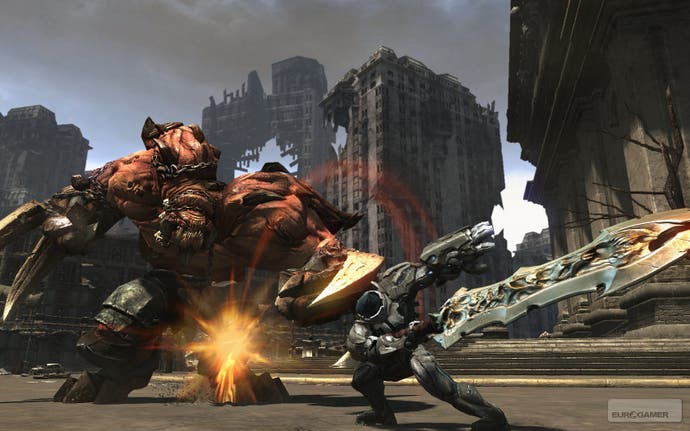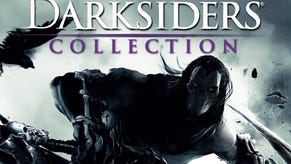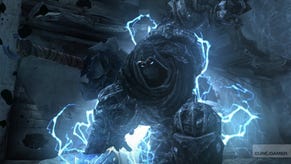Darksiders: Wrath of War
Apocalypse neigh.
To its credit, Vigil is hardly coy about its inspirations, explaining that the developers have chosen to make the kind of game they themselves enjoy playing - no prizes for guessing which titles were cited. And despite the many borrowings, Darksiders is surprisingly easy to forgive. This game isn't going to redefine action titles, but it seems likely to succeed in its humble ambition of playing the same old tricks in a relatively exciting manner.
The dungeon we played through was a case in point. Although it worshipped rather heavily at the alter of the locked door - every puzzle we saw was essentially about getting a barrier to open, whether by blowing it up, killing a set number of enemies, or finding the right item to act as a key - there's enough variation on the theme to keep things fresh. The game sets up an idea, and then quickly messes with it: Crystal Swords must be inserted into statues to act as keys, which is simple enough at first, until you find an enemy that can only be defeated with the Crystal Sword, and an element of strategy starts to creep in.
The pacing's also looking promising, with platforming sections providing regular breathers in amongst the fighting. It's the usual suspects again: moving around ledges, jumping between pillars, and even tugging about a few tired old blocks. But there are thoughtful inclusions here too, such as War's glider wings, presumably built by Beelzebub himself from some tattered Teflon he had lying around after a spot of evil windsurfing, that allow you to control tricky descents, and can also be used in conjunction with air vents to boost you up to higher platforms.

Darksiders lacks the more elegant structure of the Zelda dungeons, where the design often manages to keep backtracking to a minimum, and there are moments here where you have to struggle to remember which key you're meant to be looking for to work which piece of machinery to open which set of doors and raise which platforms, but although things starts fairly simplistically, the game's soon chaining rooms together into more complex and satisfying spatial puzzles. It also wisely chooses to construct proceedings around a good bit of spectacle - in this case an ongoing fight between a friendly neighbourhood griffon and a huge bat-like dragon, which intrudes into the puzzles on a few memorable occasions, before the victor emerges as the eventual boss battle.
And the visual design is often excellent. This should come as no surprise, as Vigil is co-founded by comic book artist Joe Madureira, the man responsible for bringing a touch of Manga to mid-nineties X-Men titles, and creating the Battle Chasers series. Madureira's War is a charismatic lead with his glowing eyes and oversized fists, even if he's a surprisingly squat and compact on-screen presence, and Ruin, all black flesh and fiery hooves, is about as satanic a hell-horse as you could ever wish for. This attention to detail isn't limited to the main characters: the dungeon's mini-boss, the Jailer, is a brilliant piece of design - a hulking, asymmetrical troll, with a cage set into his chest where the real brains behind the operation, a puny and weak-eyed goblin, lurks.

Environments are equally evocative, and the two overworld areas we saw - a shattered city filled with wrecked buses and toppled skyscrapers, and the sparser wilderness of the Ashlands, with its bleached golden light and dust storms - managed to work as stylish depictions of dereliction, while also looking like entertainingly open playgrounds. The dungeon wasn't bad, either: a traditional church at the outset that increasingly grows more bizarre, elaborate, and volcanic as you work your way down through it.
In the end, we came away from Darksiders feeling slightly conflicted. Some of its thefts are genuinely shameless, but, so far, there's plenty of signs of the skill with which these borrowed mechanics are being utilised. This is throwback gaming that, despite the 3D perspective and general polish, is essentially unchanged since the days of the 16-bit era, and, perhaps in part due to the familiarity, the section we played was undeniably enjoyable. Darksiders certainly seems likely to put its pieces together with style and a fair degree of inventiveness, then, but the finished game may not have many ideas it can truly call its own.








